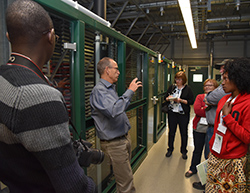 The next stop on my Bayer CropScience headquarters tour during the 2016 IFAJ Congress was the enormous “store” or research compounds overseen by Dr. Mark Drewes, head of Research Compound Logistics at the facility in Monheim am Rhein, Germany. With more compounds being added all the time, the 2.5 million chemical structures stored in this automated warehouse offer researchers a fountain of information.
The next stop on my Bayer CropScience headquarters tour during the 2016 IFAJ Congress was the enormous “store” or research compounds overseen by Dr. Mark Drewes, head of Research Compound Logistics at the facility in Monheim am Rhein, Germany. With more compounds being added all the time, the 2.5 million chemical structures stored in this automated warehouse offer researchers a fountain of information.
“We call ourselves the treasure of research,” Dr. Drewes tells Chuck Zimmermann. “I think for a scientist it is an ideal sort of world, to try out new ideas and maybe make a new discovery.”
The facility processes in the neighborhood of 2,000 requests a day; and the collection at Bayer Crop Science isn’t even as large as the storage for the company’s health care division. With both sides collaborating together to get the most out of their research, automation is a key to success. With millions of compounds being moved and used, the advanced system is the only way to avoid making numerous mistakes, Drewes notes. And his staff of 13-16 would swell to at least 100.
And new compounds are added to this amazing collection of data regularly. One third of them are created internally by scientists wondering ‘what can I do?’ and making it happen. Another third come from Bayer’s health care division, and the final third are produced by companies in China that do legwork for Bayer’s researchers.
Considering that these chemical structures are made just for Bayer and are unique tools for research, safety and security are high on the priority list. Besides careful attention to IT, they also have an extremely advanced fire security system. They also keep some samples in Frankfort, to ensure a major disaster can’t shut down research entirely.
Automation and security might be of greatest interest for Dr. Drewes at the moment, but ask him in another year and he might have a different answer. “One of the things we have now built up, which is due to go online in the next two to three months– we’ve built up a totally new evaporation system to get rid of solvent.” Drewes shares. “This is unique, it is the first time in industry that something like this has been built, together with my engineers and other people.” The technique will cut evaporation time from two days to two hours, and is a gentler process as well. If all goes well, this technique may be shaping the face of research for the next decade.
To learn more about Bayer’s research compound, listen to my full interview here: Dr. Mark Drewes, Bayer CropScience


